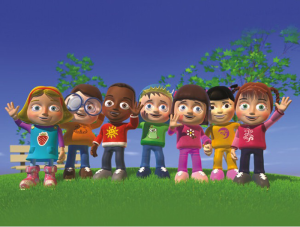
This is an article specially written for CRC by Early Years.
The MIFC (Media Initiative for Children) Respecting Difference Programme is delivered by Early Years, an organisation dedicated to working with and for young children. Early Years is supported through the Community Relations Councils Core Funding Scheme.
Respecting differences
The MIFC programme is an intervention programme aimed at improving long term outcomes so that children, practitioners/teachers, parents and communities become more aware of diversity and difference issues and positively change attitudes and behaviours to those who are different. It aims to make a respecting difference approach an integrated experience for young children within a variety of settings and is based on a meaningful partnership with parents and the wider community.
The anticipated outcome: young children respect those who are different.
Until the early 1990s Early Years had adopted a non-sectarian (not associated with a particular religious denomination) and non-political (not associated with any particular political party) approach to its work, but felt that the peace process created an opportunity to promote a more explicitly anti-sectarian approach that encouraged respect for diversity.
Ethnic differences and prejudice

As Early Years was looking at ways to develop their anti-sectarian and diversity work, others in Northern Ireland were also developing theory and knowledge on ethnic differences and prejudice in young children. The report, Too Young to Notice? (Connolly et al 2002) showed that even at age three children were beginning to be affected by the divisions that existed in Northern Ireland and were starting to internalise the cultural preferences and attitudes of their own communities. By the age of six, 33 percent of children were making sectarian remarks.
Respecting Difference Programme pilot
In 2004 the MIFC Respecting Difference Programme was piloted in ten playgroups across Northern Ireland. Over a three-week period five of the groups implemented the programme, while the other five acted as control groups. Pre and post implementation research was carried out by Professor Paul Connolly from Queen’s University, Belfast. In just three weeks measurable effects of the pilot programme were found in terms of:
- Increases in young children’s abilities to recognise instances of exclusion without prompting
- Their ability to understand how being excluded makes someone feel
- Their willingness to play with others including those who are different to themselves.
Positive effects
Furthermore in 2008/2009 the MIFC Programme was subject to a randomised controlled trial led by Queen’s University Belfast, involving 74 settings from Northern Ireland and the border counties of the Republic of Ireland. There was robust evidence that the Programme achieved positive effects regarding children’s attitudes and awareness in relation to their socio-emotional development, cultural awareness, and inclusive behaviour.
Two of the main recommendations stemming from this study encouraged further development of the programme to work with younger children aged 2-3 years, focusing on feelings and emotions and to extend the programme up into the Foundation Stage of Primary Education.
Read the full study here: https://www.early-years.org/s/mifc-exec-summary.pdf
Exploring and experiencing differences
Now, in 2022 research continues to show a need for children in Northern Ireland to be able to explore and experience differences in a more positive way.
In a recent international study by Queens University Belfast with children from Kosovo, Macedonia and Northern Ireland, the Queen’s researchers found the same pattern – as children get older, they begin to form a preference for certain symbols. Yet, children also shared resources with others across group lines, which the researchers say is a positive sign and suggestive of future peacebuilding.
Dr Laura K Taylor states, “The research suggests that primary school may be a sensitive period and potentially a good time to work on prosocial behaviour – behaviour that intends to benefit others – one way of addressing this could be through empathy interventions or promoting inclusive, overarching identities.” June 2022.
Read more about this here: https://www.qub.ac.uk/News/Allnews/featured-research/children-relate-political-religious-sporting-symbols-five.html
Core Funding support
Thanks to continued Core Funding from the Community Relations Council, we at Early Years – the organisation for young children – are delighted to be able to support the early years sector (in specific funded areas) with training in the MIFC programme.
This allows practitioners to develop knowledge, skills, and confidence to implement the research-based programme with young children, parents and their communities with the anticipated outcome that young children respect those who are different.
For more information contact Eileen McClean by email eileenm@early-years.org
Visit the Early Years website: https://www.early-years.org/respecting-difference